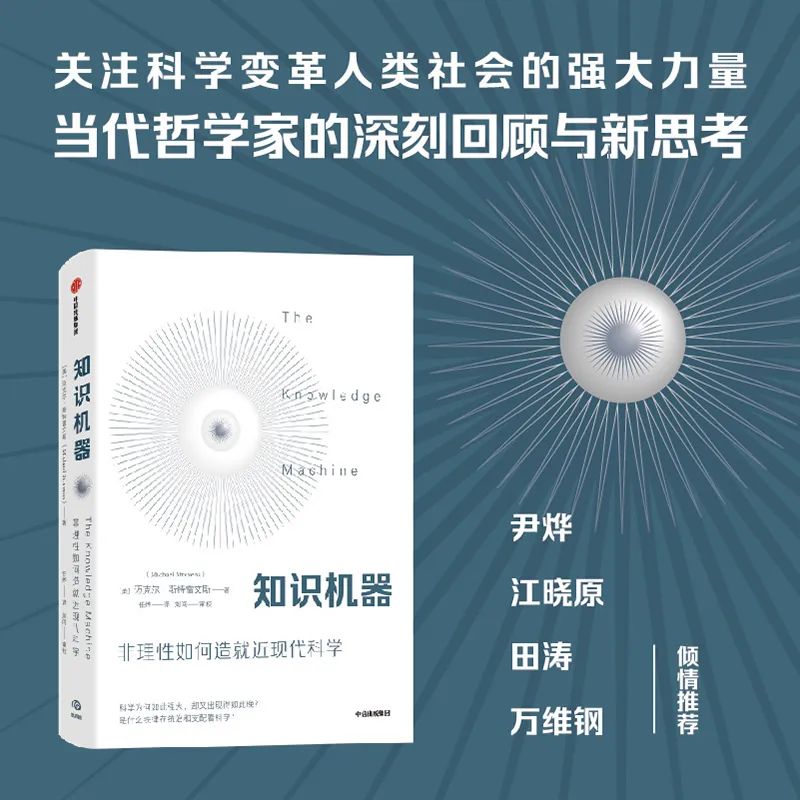Book of Books | Strategic irrationality of science
Author:Data School Thu Time:2022.07.30

There is a data school Thu benefits in the text

Why did science experience such a long time? Because the iron law looks like a bad idea.
"Acknowledge ... the only premise of theory is that their content is consistent with the facts observed." This sounds as the scientific spirit as Esque Newton or Richard Ferman said, but this sentence is Asia Lisid wrote in the 4th century BC. Aristotle is an organized observers, a theorist with innovative spirit, and a first -class intellectual. He put the ability to explain the phenomenon in the first place.
What stops him from creating modern science in 2000 in the modern scientific revolution?

By writing a history of a scientific revolution to answer this question, this question is a very attractive proposal. We will see those society, knowledge and economic factors that work in the 17th century in the era of Aristotle almost or completely do not exist: The influence of the mechanical theory proposed by Descartes and Boliko, the application of mathematics in the process of physical theory, new technologies such as printing, lens polish and glass blowing, and people have begun to regard the exploration of nature as a kind of nature as a kind of nature. Noble religious worship.
This will be a fascinating story. However, this narrative cannot distinguish what factors are essential for modern science itself, and which factors are only essential for modern sciences developed in the 17th century. Of course, there is no gamali or Newton without mathematics, but not all scientific research requires higher mathematics (the development of chemistry does not need). Although there is no atomic theory, it is impossible to have Golita or Huyatus, not all sciences are about interaction between molecules (naturally selecting the theory of evolution is not). Although Galileo and others shake the astronomy of the 17th century with telescopes, the results obtained by the planet observation obtained by the naked eye are enough to support the new gravity theory.
Therefore, in order to figure out why science has occurred for so long, I did not start from narrative history. Instead, I tried modern science as a whole from the perspective of philosophy. Factors of decisive effects when the ability. As a result, I found that this necessary condition is the iron law of explanation. Aristotle and many other natural philosophers, the reason why they failed to start our knowledge machine in many places and many times, because although they attached importance to observation, they did not create iron laws.
We can compare Aristotle and Newton. The two goals are the same, and they want to find a grand theory to explain the movement and change of object movements. However, their methods are very different. Aristotle conducted a strict philosophical test on his hypothesis. Newton conducted a strict quantitative inspection of their hypotheses, requiring them not only to explain the characteristics of the movement (the circular movement and linear movement, rise and decline), but also explained the most precise details, such as the Cairple Law Firm described by the Law Foundation of the Law Firm The precise trajectory of the planet.

Facts have proved that quantitative testing is more important. Although Aristotle has carefully studied various natural phenomena and is very concerned about his ability to explain these phenomena, he is usually satisfied with explaining universal models, not specific details. However, the ability to discover the truth to discover the truth is largely relying on these tiny facts.
Kun also saw that human beings have to keep long -term attention to these extremely important tiny facts. These fine branches rarely include truly interesting content, and it is a very hard work to refine them out of nature; and noble mental activity (whether conceptual, philosophical or systematic) always seduce Experienced researchers leave the experimental table or observation station to go to the flash of thought. Most scientific work is more like a bookkeeping or a long -term division, not a poetic self -expression or polar adventure. It is almost impossible for a great man to pursue such a life.
The method of solving this problem with iron law is not to try to beautify obviously boring, but to adopt a more indirect and roundabout strategy. I have previously explained that the iron law sets scientific disputes into a chess game that defends and attack hypotheses. In this chess game, there is only one way to go legal, that is, an experienced test. Attacking a hypothesis is because it fails to explain certain observations, and defending this assumption that it is proved to be only a appearance, which is caused by equipment failure, unfavorable conditions or error assumptions. Smooth words, highly abstract research, preaching, and any other form of ingenious words or magnificent thoughts can not bring victory. In order to win the game, players must complete a detailed observation.

If Aristotle follows the iron law, it must be studied in physics, chemistry, biology, psychology and astronomy according to the rules of this game. Like all enthusiastic players, he had to give up the pursuit of higher harmony. As a result, the physical strength and intelligence of liberation will flow in the only direction of the only direction and flow to the cold and ruthless empirical test. If so, when he died in 322 BC, a classic modern scientific revolution was likely to start.
But Aristotle is a serious thinker. Even if he thinks of such a game, he will immediately deny this idea. He did not intend to give up philosophical reasoning.
He is not an imaginaryist -he does not advocate philosophical reasoning that is contrary to observation results. In fact, he advocated combining philosophy with observation, and when the observation results conflict with the philosophy, Aristotle paid more attention to observation results. When criticizing some seniors, he wrote: Their explanation of the phenomenon is not consistent with the phenomenon itself. The reason is that the basic principles they assume are wrong: they have some pre -determined views and are determined to make everything consistent ... It seems that some principles do not need to be judged according to their results, especially the final based on the end. As a result, judge! And that result ... in natural knowledge ... is the phenomenon of perception. Therefore, the iron law will not bring any new sources of information or any new processing information to Aristotle, but will only let him abandon philosophy. This seems to be an unfair transaction: abandoning a valuable source of information, that is, philosophical reasoning, but there is no return. This seems unreasonable and brutal, which can be said to be completely unreasonable.
Similarly, the iron law also intentionally ignores religion, spirit, and theological reasons that recognize a certain view. Throughout history, believers always believe that their religious teachings will affect the material world and spiritual world, and of course, there is also an impact of the biological field. From 1841 to 1866, the pain of William Hughel, who was the dean of Sanyi College of Cambridge University, suffered a dramatic manifestation of the potential conflict between cognition and iron law. By studying the newly discovered fossil records, Hugale saw the event of large -scale species. He believed that only God's intervention could explain this phenomenon. Therefore, comprehensively understanding the history of life requires unified research on geology, biology, and theology. However, the iron law of the iron printed in his mind from Hugal was banned from conducting such comprehensive research in scientific works. Although this seemed wrong and even a little ridiculous, he still overcome his doubts and bowed his head to scientific methods.

We can project the root cause of Hugh's confusion to the history of thousands of years before the emergence of modern science. In the golden age of the Middle Ages and the same period of the European century, you will find that thinkers explore the way of operation of nature through astronomy, optical, medical and other methods. None of these ideas think of things like iron law, and they can't think of them. They are all believed in God in their own way. They know that the understanding of God's or "God's Plan" may tell us about the way the material world (history, life, planetary system, etc.). Although the help provided by theology for empirical studies may be relatively small, this possibility is worth exploring.
However, the iron law resolutely prohibits this exploration. In the field of science, only experienced reasoning is count. Therefore, for those who are different from Hugale and have not seen a series of amazing discoveries, scientific research seems to be a way to explore the world intentionally. It is meaningless for these researchers to prohibit theological thinking, just as it is meaningless for Aristotle to prohibit philosophical thinking. Therefore, in the centuries of Augustine, Avilona, Aviro, and Aquina, it is not surprising that there are things similar to iron -like.
Even the early modern thinkers like Lesne Descartes in the modern scientific revolutionary storm cannot endure the practice of dividing experience research and theological research by iron law. Descartes' natural philosophy reflects the power and supervision of God in many ways: for example, he believes that God ensures that the concept that is very suitable for thinking about this world in our minds is The state of uniform speed peripheral movement. In the perspective of Descartes, when studying nature, the extremely important fact that the existence and attributes of God (omnidirectional, omnidirectional, and benevolent) are prohibited like iron law. Therefore, we will find that Descartes' articles are not interested in the absolute requirements of the iron law, just like the articles of almost everyone before him. In the 1840s, although Bacon and some other radicals did their best, science was still unwilling to appear.
This is why science appears so late in human history: it seems to be an unlikely successful cause, a activity that intentionally create lack of knowledge. The iron law emphasizes that observation is important. This is not difficult to accept, but it is the most difficult to accept that it is important to insist that only observation is important. This "anti -wisdom" ban closed all parts except the eyes except the eyes Essence

Therefore, a vicious cycle makes human thinking that cannot obtain the ability to feel science: if you do not check the iron law in practice, it is impossible to understand how much it uses it is, but if you do n’t know how much it is useful for it, there is no reason there is no reason to have no reason. Check it. In fact, it is sufficient to not test it: it ignores the source of knowledge that is considered indispensable. The logic of this cycle trapped the ancient Greeks and the Middle Ages and early modern philosophers, such as Descartes. I guess it has also trapped the thinkers of China and North Korea, India and Persia, Central America and the Andes. Even if they have considered the iron law, they will scoff at it; it is almost certain that they have never had such ridiculous thoughts.
In 1859, 20 years after Hugale tried to explain the fossil records with complex divine theory ideas, Charles Darwin published "Origin of Species". Naturally, the theory of evolution was injected into the Victorian scientific community, and it also shocked the entire society. On the issue of creation, God seems to be excluded. In 1878, the evolutionary scholar George Romanes wrote pain in pain: "The no faith gate has been opened, and the atheism is coming to us." This was by no means caused by Darwin. Geologists have doubts about the existence of "big floods"; the scholars have proved that the Bible is compiled by articles written by many different authors in different times; French revolutionaries, British poets, and Germany Social thinkers are imagining a world that is not bound by religious organizations. With the development of Europe in the 19th century, the cloak of faith began to slip from the shoulders of human spirit.
Today, about one -third of the American scientists believe in God. Even these believers do not consider their spiritual beliefs to affect their research in any substantial way. For various practical purposes, they agreed with Stephen Jay Gould, and believed that science and religion are legal forms of two completely different themes. They are "unparent areas". Essence If you want to understand the meaning of life, you must learn religion. However, to understand the origin of the planet's movement and species, you only need to observe experience. Therefore, for most contemporary scientists, the iron law excludes religious factors without any unreasonable places outside of scientific disputes.
The same is true for iron law to exclude philosophy demonstrations. For example, most physicists believe that trying to explain quantum mechanics so that humans can understand it is to waste time. As long as the mathematical mechanism is used to make predictions and build a shallow explanation, they will say, "Close your mouth and write to calculate." Physicist Steven Winberg further said: As far as I know, I know, Among those who actively participated in physics research after the war, none of them have received great help from the results of philosophers.
Today, people have generally believed that religious and philosophical factors have nothing to do with science. Does this mean that the iron law has lost logical abnormal appearance? Is it not necessary to cut the seemingly reasonable non -observation reason? In that case, we have praise science. It not only has rich results, but also a model of rationality.

However, we do not have such science: even today, the iron law gives people an irrational feeling. However, the example here is no longer a few of the gods who believe that their beliefs play a role in the material world, or the scientists who try to obtain theoretical awareness through philosophical methods. What I think of is many contemporary scientists, including Weberg himself, and they are widely praised and believed that it can explain a form of reasoning the mystery of nature: to demonstrate its authenticity on the grounds of a theoretical beauty.
Scientists prohibit scientists from using all such arguments in formal communication channels. Therefore, if modern researchers think that aesthetic literacy can indicate the road to the truth, it is necessary to feel that scientific methods have intentionally ignored some important value. In other words, although scientific methods are effective, strictly speaking, it violates the principles of rationality.
——Elected from CITIC Publishing House · Pharise Studio "Knowledge Machine: How to Create Modern Science"
Data School THU exclusive benefits!
not


Fans who are the data of the data school have won 3 books benefits! Welcome friends to talk about the view of "how irrational how to create modern science" in the message area below. We will send the highest number of likes (as of 8 o'clock on August 2, 2022). Book ~ Xiaobian will contact you! (Fans who have obtained books before can not participate)



- END -
Improve service efficiency to create a "warm" business environment

In recent years, the Suzhou police have fully played their functions, strengthened...
Floating garbage on the sea surface of my country's near -shore waters is at low and medium levels

Xinhua News Agency, Beijing, June 23 (Reporter Gao Jing) Zhang Zhifeng, deputy dir...